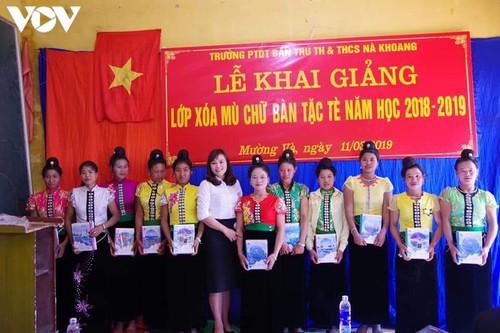 An illiteracy eradication class in Tac Te hamlet. (Photo: VOV) An illiteracy eradication class in Tac Te hamlet. (Photo: VOV) |
Over 2,500 people have become literate over the past 4 years in Sop Cop, reflecting the efforts of the local administration in fighting illiteracy. Tong Thi Quyen, Deputy Head of Sop Cop district’s Education and Training division, said that in 2015, Sop Cop had nearly 4,500 illiterate people. To counter this problem, classes have been established across hamlets and staff have been sent to each household to encourage people to learn, Quyen said.
"Firstly, we help them to understand that it would be more difficult to raise their kids if they are illiterate. Many mums have given their kids the wrong food and medicine as they can not read the instructions. Secondly, we point out why their rice fields are not growing well while others are having bumper crops due to the fact that the others can read and learn about different rice breeds and proper fertilizer to use. We also tell them that they’ll remain poor and are unable to develop their household economy because they are illiterate," said Quyen.
Due to limited human resources, Sop Cop district has coordinated with army units stationed in the locality to open classes for the local people. Colonel Tran Manh Cuong, Deputy Head of 326 Economic and Defense Corps, said every year, the corps has sent its staff to teach the local ethnic communities. Since the beginning of this year, they have organized 5 classes for 125 students, according to Mr. Cuong.
"The local people’s living conditions have improved remarkably after they attended classes by Corps 326. It has become much easier for us to encourage them to move their cows and buffaloes from under their stilt houses to proper sheds by just sending them papers to explain, which used to be very difficult for us when they could not read," said Cuong.
Party Secretary and Political Commissar of Nam Lanh Border Station, Lieutenant Colonel Lo Van Binh, said that in addition to their regular tasks of protecting national borders, his station has sent staff to learn teaching methods to support the local authorities’ efforts. Nam Lanh Border Station is organizing 2 classes in Hua Lanh and Huoi Hia hamlets.
"The local people are very eager to learn. After learning how to read and write, they can apply new technologies into planting and raising animals to develop their household economies. Lately, they have been successful in applying new techniques for planting fruit trees on sloped land," said Binh.
The number of illiterate people aged between 15 to 60 in Sop Cop district has decreased remarkably. However, early 2020 statistics show that the rate of illiteracy relapse remains high with 3,700 people.
"We will continue to help people acknowledge the importance of learning. We have asked our primary teachers to teach in these special classes. In addition to cooperating with the army, we will also call for support from individuals and organizations to sponsor such classes," said Deputy Chairwoman of the People’s Committee of Sop Cop district Tong Thi Kien.
Sop Cop has also encouraged families to send their kids to classes at their proper ages while boosting education universalization at all stages.